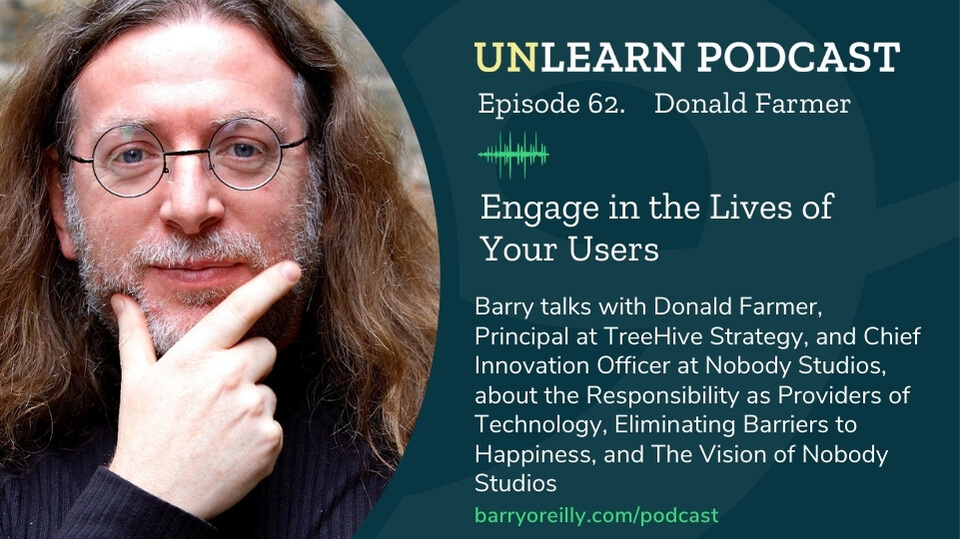Some people just do things differently. Data analytics expert and advisor Donald Farmer is one of them. Donald works with Barry O’Reilly at Nobody Studios where he serves as the Chief Innovation Officer. With his company TreeHive, Donald advises enterprises and non-profits in emerging economies on innovation, strategy, and the uses of data. His career has taken him around the world and into a huge range of industries, from fish farming, to managing a village nursery, to being the face of business intelligence for Microsoft. He and Barry talk about how to engage with your users and create a better world for the people who live in it through technology and innovation.
Different not Better
“I’ve never been interested in computers for their own sake. I’m really interested in what I can DO with it.” Donald tells Barry, “I see the machine as an intellectual lever that allows me to do more – that’s what’s interesting to me.” This leveraged power is important because there is a lot in the world that needs changing. A guiding principle of Donald’s work is that each individual is unique – humans can’t be aggregated into categories for whom one solution will work all the time. By moving away from the industry standards of incremental change and towards exploring alternative solutions that make things materially better for people, Donald is able to ask how a new company or idea will help change the way things are done. [Listen from 01:55]

A Pivotal Moment
Barry wonders about the choices Donald made that really clarified this perspective of focusing on humans above all else, and Donald shares a story about a fish farming tech startup he developed while doing some consulting work in the Scottish Highlands. He formed a company that productized the data around fish weights and measurements and aided in the complex calculations needed for transporting and exporting and so on. Eventually, they sent the product to Japan, where it was extremely well received, except for one major issue: the computer beeped when a data entry error was made. Now, in Scotland, no one cared about this, but in Japan, the public announcement of errors was intolerable. The context of the technology was different, so the product needed to be. Barry notes that you can execute an algorithm correctly, but when we’re talking about people using a product – the things that make them feel good can vary. [Listen from 08:00]
Your Responsibility as the Provider of Technology
Donald worked on another startup, one that eventually drew the attention of Microsoft, which was a massive change not only in the size of the parent organization, but also the team he was working in and the number of customers they were serving. This made innovating difficult because how do you change something 500 million people are using in a certain way? He and Barry talk about a virus that was exploiting a bug in one of the systems – one that had already been fixed, but was vulnerable because not enough people had upgraded their systems. Ultimately, people may have died because of this computer virus, which goes to show that “you actually need to get out and engage in the lives of your users” if you’re going to try and innovate the tools and technology they use. [Listen from 11:45]
Don’t Solve Problems. Eliminate Barriers to Happiness.
So much of software design starts from trying to understand the user problem. This sounds great, but Donald wants to start with what’s good in someone’s life – their job, their business, etc. Then the problem is what gets in the way of the good stuff. The first step in modeling a problem is to model a positive situation, and look at how to make it easier to achieve that. Barry adds that when you’re constantly looking at the problems, you’re often overlooking better approaches: What does great look like? Problems are the obstacles in the way, so let’s design for the aspiration – you’re thinking bigger, you’re creating more options, etc. It’s an interesting way to look at the world – especially in startup space where people are always talking about the problem they’re solving, not the great world you could be creating. [Listen from 20:45]
Nobody Studios
The vision of Nobody studios is to rapidly build a very large number of startups, but very differently from the traditional venture model, which is extremely broken. Venture startups are usually built with a financial and technical imperative – no one asks if it’s good, valuable, sustainable, or responsible. This means that a lot of ideas that might not tick those tech and finance boxes never get a chance – and that’s what is so exciting about Nobody – it’s a lighter touch focused on human, social, and personal values. [Listen from 26:55]
(check out the previous podcast with Aidan McCullen, host of the Innovation Show and bestselling author of Undisruptable)
Looking Forward
“We’re seeing two things coming together in society as a whole.” Donald explains. One of those things is the applicability of technology, and the other is the current crises – maybe the largest and most damaging that we’ve seen in history. “If you bring our technologies, which enable us to investigate, understand, test, design, and respond more effectively than ever before, with crises that are bigger or dramatic, more accelerated than ever before, then I think we have a critical role to play.” That, he says, is what really motivates him. [Listen from 35:00]















